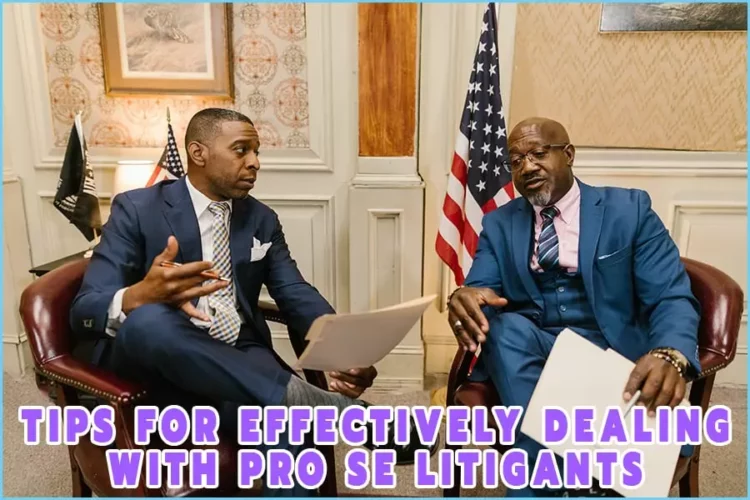The Constitution protects the rights of the accused. These rights are in the Sixth Amendment.
The Constitution guarantees the right to a fair trial. It also stipulates that you have the right to a jury trial of your peers. The Constitution also stipulates that you have the right to legal representation.
If you cannot pay for an attorney, the state shall provide one for you. The state attorneys are public defenders paid for by the government.
Some defendants waive their rights to have legal representation. The court can turn down a request for self-representation if it deems the defendant incompetent.
Tips For Effectively Dealing With Pro Se Litigants
Dealing with Pro Se litigants is not easy. Most people who opt out of using legal representation aren’t legal experts. Most of the time, these folk do not understand legal proceedings and the legal processes.
In many cases, the courts deny a waiver to an attorney. You might be competent enough to stand trial but not enough to represent yourself.
Here are some tips on dealing with pro se litigants:
1. Diffuse The Situation
Many Pro Se plaintiffs act out of impulse and anger. As an attorney, you might diffuse the situation through communication.
You should contact the plaintiff first and demonstrate empathy for their situation. It may not always work, but it is an effective step to prevent litigation.
2. Clarity Regarding Roles
It often happens that Pro Se litigants request guidance on court proceedings. In these cases, the defendant may inquire about the appropriate responses for issues such as motions. These queries often get directed to the plaintiff’s counsel.
The plaintiff’s counsel is required to respond professionally and ethically. You should inform the defendant the plaintiff’s counsel is working in their client’s best interest. They are under no obligation to incriminate their clients.
Generally, lawyers should avoid advising an unrepresented party. If an unrepresented person asks for advice, you can clarify that you do not represent them.
The defendant must understand that the opposing counsel cannot assist during litigation.
3. Maintaining Professionalism
Nothing will push you to the edge like a Pro Se litigant who is oblivious of court processes. Some defendants can be rude and uncouth. As a lawyer, you have to be professional all the time.
You should be patient with Pro Se litigants. Some litigants can be aggressive or curt in their responses.
Remember that you have a duty to your client. Losing your temper does not help your case. It could even harm how you come off to a jury or the judge.
Emotions often cloud judgment, and lashing out at a defendant is unwise. Instead, you should try not to antagonize the Pro Se litigant.
4. Negotiation risks
You should be cautious when making settlement agreements with a Pro Se litigant. Always remember that a professional code of conduct does not bind the litigants.
Attorneys have a code of conduct that addresses misrepresentation. Pro Se parties may misrepresent or choose to misinterpret concessions.
You should have a witness present at any settlement negotiations with a Pro Se litigant. Ensure that you make these settlements contractual. Anything agreed must be in writing, with signatures from both parties.
Pro Se litigants should understand that the agreements are legally binding. A third-party witness to the contract ensures nothing gets taken out of context.
The ProSe litigant can’t claim that they agreed to settlement terms under duress. It is why if you have another party present.
5. Never underestimate a Pro Se litigant
Some Pro Se litigants may not seem knowledgeable, but do not underestimate them. They may lack basic court proceedings but have in-depth knowledge of the law.
Most Pro Se litigants sink hours into researching the law. They tend to come prepared with structured and concise arguments. You should note that they might also have more legal representation than you assume.
Unlike attorneys, Pro Se litigants can dedicate time to studying their case laws. Most lawyers deal with several cases at a time. It means they don’t have the same level of commitment to the case.
6. When to petition the court for sanctions
Dealing with Pro Se litigants is a real test of patience. You should try and understand that the litigant may not understand court proceedings. In most cases, the court tends to pardon the conduct of the Pro Se litigants.
In most cases, the judges don’t look kindly upon retaliation by any party.
You should only petition the court if these violations are consistent or severe. You can also petition for sanctions if the violations deliberate to stall proceedings.
Why Most Pro Se Litigants lose
Pro Se litigants have a fairly low win rate in courts. Many courts actively discourage Pro Se litigation.
Many of them falter and make these common errors:
Misinterpreting the law
Many Pro Se litigants fail to interpret laws correctly. It gives them a false sense of confidence going into trials.
The lack of legal experience is a real challenge for Pro Se litigants. Laws and statutes tend to use complex language that often confuses most folks. They may also take legal advice from people who do not fully understand how to interpret laws.
Pro Se litigants often make many mistakes in the course of the trial. It includes filing incorrect motions. As a Pro Se litigant, you need to understand that laws are not as straightforward as they appear.
Ignorance
Some Pro Se litigants do not fully comprehend the gravity of court proceedings. They also don’t do enough research on their cases.
Lawyers can use Pro Se’s ignorance of the law to their advantage. Many times, the litigants shoot themselves in the foot through their statements.
The courts advise against self-representation in most cases, but the decision rests with the plaintiff or defendant. If you are ignorant of the law, you should avoid taking on self-representation.
You should also understand that many laws have limitations. Many Pro Se litigants use a section of the law as a defense ignoring rights limitations.
Lacking emotional awareness
It is easy for an opposition’s legal counsel to take advantage of a litigant’s emotions. Lawyers use underhanded tactics to oppress and get beneath the opposition’s skin.
Many Pro Se litigants lack the legal experience or emotional mantle to see through these tactics. They might find themselves lashing out or incriminating themselves.
Many judges and juries don’t look favorably upon people who lash out in courts. Lawyers are aware of it and usually take advantage.
A Pro Se litigant’s inability to see through the lawyer’s tactics is detrimental to their case.
Not understanding the importance of a court reporter
A court reporter transcribes court proceedings. They use a stenographic machine to note down statements in real-time.
The transcripts are official documents. They are really useful appellate cases.
Courts are normally inclined not to overrule the decisions of other courts. They rely on the competence of lower courts. A court reporter’s transcript can persuade a court to reconsider its stance. Additionally, some companies offer AI-powered legal transcription services, ensuring accuracy and efficiency in generating transcripts for legal proceedings. This technology complements traditional court reporting by providing a reliable and fast alternative.
The appellate court can go through the transcript and marry it with the Pro Se litigant’s defense. You have a better chance of reversing the verdict if you bring a court reporter.
Lacking Confidence
Lacking confidence is a huge problem for Pro Se litigants. The courtroom atmosphere is normally intimidating.
Lawyers can tell that the litigant is short on confidence. They may use cunning tactics to get the litigant to forfeit their case.
Lacking confidence usually stems from not being well vast in the law. Research and advice from competent people could help you overcome your confidence issues.
Preparation is important. Take time to collect your points and present your arguments logically and coherently. The lawyer’s job is to try and throw you off your game so stay focused.
Veering off the case strategy
Many Pro Se litigants are easy to sway off their case strategies. They do not seem to understand how to impose themselves on proceedings. Lawyers easily take advantage by taking the litigant’s focus off the main case points.
Allowing the opposition lawyer to take control of the case is not ideal for the Pro Se litigant’s case.
Being proactive helps the Pro Se to state their augments and prevents self-incrimination. It gives them a good basis for presenting their case.
Conclusion
The Constitution protects the accused’s rights. The right to a fair trial gets guaranteed under the Constitution. It also states that you have the right to a jury trial before a panel of your peers. The Constitution also guarantees the right to legal representation.
If you cannot afford an attorney, the state will provide one for you. The state lawyers are government-paid public defenders.
Some defendants waive their legal representation privileges. If the court finds the defendant incapable, it may deny the motion for self-representation.










